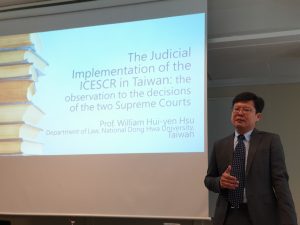On Friday 13 September 2019, Professor William Hui-yen Hsu from National Dong Hwa University gave a guest lecture at the Finnish China Law Center. The topic of his presentation was ‘The judicial implementation of the International Covenant on Economic, Social and Cultural Rights (ICESCR) in Taiwan – observations on the decisions of the two Supreme Courts.’

Professor Hsu began with a short introduction to Taiwan and its effort to promote and enforce several international human rights treaties. Despite having been a non- member of the United Nations (UN) since 1971, Taiwan retains a strong will to contribute to international society. It has attempted to internalize many human rights standards as envisaged in the human rights treaties endorsed by the UN through ratifying the International Covenant on Civil and Political Rights (ICCPR), the International Covenant on Economic, Social and Cultural Rights (ICESCR) and the Convention on the Elimination of All Forms of Discrimination against Women (CEDAW).
He added that nevertheless, Taiwan’s instrument of ratification was rejected by the UN Secretary-General and thus, was never a formal member of the ICESCR. The ICESCR became binding on Taiwan by means of unilateral declarations made by the President and the Government. To prevent any misunderstanding regarding the bindingness of the ICESCR on Taiwan, the Parliament passed legislation which incorporated the content of the covenant into Taiwan’s domestic law.

Professor Hsu observed that Taiwanese domestic courts have increasingly used the ICESCR as tool for implementing and enhancing domestic law, and confirming the legality of administrative acts. Training is developed for judges and lawyers to deepen their understanding of the covenant. From 2009 to 2019, the ICESCR has been invoked in 94 civil, criminal and administrative cases before the Supreme Courts, primarily regarding the right to adequate standard of living under Article 11 (invoked 32 times), family rights provided by Article 10 (invoked 15 times), right to work stipulated in Article 6 (invoked 11 times), and cultural rights under Art 15 (invoked 10 times). In 30 of these cases, the Courts have positively applied the covenant. The Professor concluded his presentation with an overview of the landmark 2019 Asia Cement Company case where Article 15 of the ICESCR and Article 17 of the ICCPR have been called upon to give enhancement to the provisions of the Indigenous People Basic Law.
